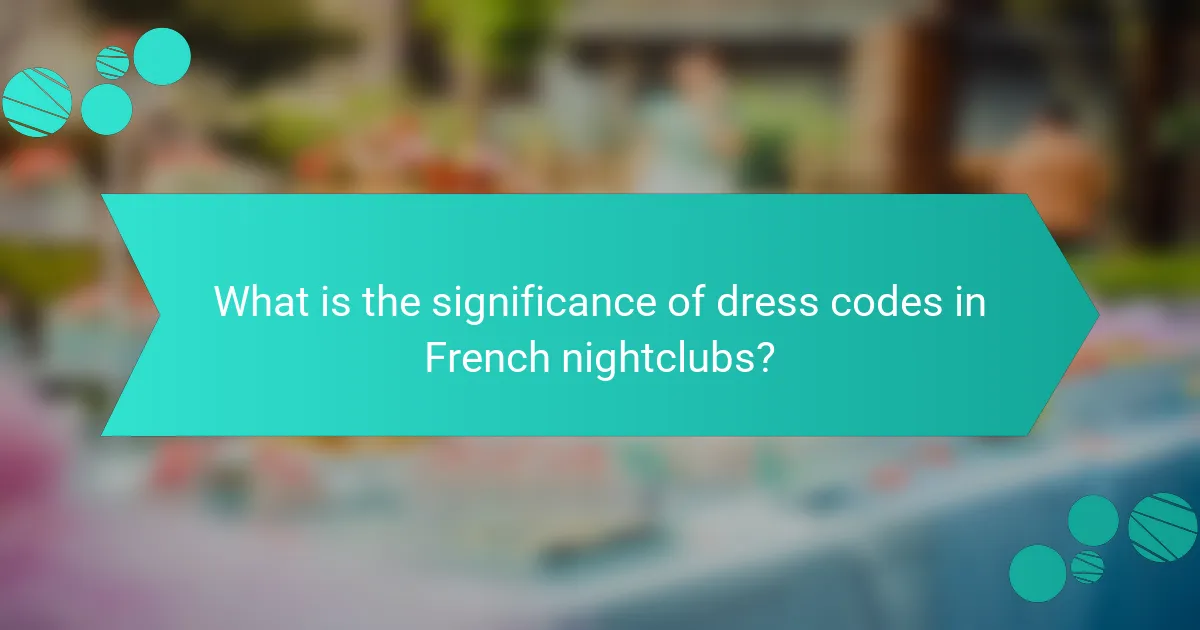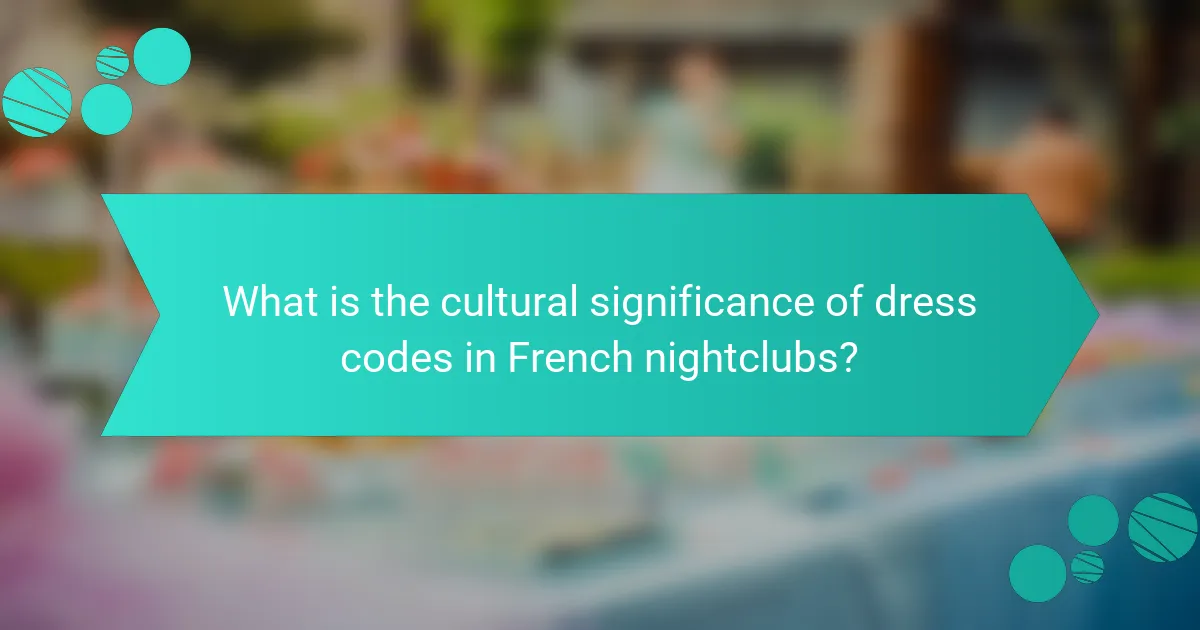Dress codes in French nightclubs play a crucial role in defining the fashion standards and behavioral expectations of patrons. These codes not only reflect the club’s identity and target audience but also contribute to an atmosphere of exclusivity and sophistication. Typically requiring smart casual or formal attire, dress codes influence social interactions and perceptions, aligning with France’s broader cultural emphasis on style and elegance. The enforcement of these dress codes impacts guest admission and shapes the overall nightclub experience, highlighting the intersection of individual expression and collective cultural norms.

What is the significance of dress codes in French nightclubs?
Dress codes in French nightclubs are significant as they establish a standard of fashion and behavior. These codes create an atmosphere that aligns with the club’s identity and target audience. They encourage patrons to dress in a manner that enhances the overall experience. Many clubs enforce dress codes to maintain exclusivity and sophistication. This practice is rooted in cultural norms that value style and presentation in social settings. Studies show that adherence to dress codes can influence social interactions and perceptions among guests. Additionally, dress codes often reflect current fashion trends, impacting the nightlife scene. Thus, they serve as a bridge between individual expression and collective cultural expectations.
How do dress codes reflect cultural values in France?
Dress codes in France reflect cultural values by emphasizing sophistication and individual expression. French culture prioritizes elegance and style, which is evident in the strict dress codes of establishments. Nightclubs often require fashionable attire to align with the cultural norm of presenting oneself well. This practice reinforces social status and group identity among patrons. Additionally, adherence to dress codes showcases respect for the venue and its traditions. Historical context reveals that fashion has long been a marker of social distinction in France. The importance of personal style is ingrained in French society, influencing both casual and formal settings. Overall, dress codes serve as a reflection of France’s cultural emphasis on aesthetics and social etiquette.
What historical factors have influenced dress codes in French nightlife?
Historical factors influencing dress codes in French nightlife include the evolution of social classes and cultural movements. The French Revolution in the late 18th century shifted societal norms, impacting how people dressed in public spaces. The emergence of the Belle Époque era in the late 19th century introduced extravagant fashion in nightlife, reflecting wealth and status. The post-World War II period saw the rise of youth culture, leading to more casual and diverse dress codes in clubs. The 1960s and 1970s brought about counterculture movements, which embraced individuality and self-expression in attire. Additionally, the influence of iconic figures in fashion and music has shaped contemporary dress codes in nightlife. Events like Paris Fashion Week have further cemented France’s role as a fashion capital, dictating trends in nightlife attire. These historical contexts demonstrate how social, cultural, and economic factors have shaped and continue to influence dress codes in French nightlife.
How do dress codes vary between different regions in France?
Dress codes in France vary significantly by region. In Paris, the dress code leans towards chic and sophisticated attire. This urban area often favors stylish, modern clothing, reflecting its status as a fashion capital. In contrast, the South of France, such as Nice or Cannes, embraces a more relaxed and casual style. Here, beachwear and light fabrics are common, especially during summer.
Regions like Brittany may reflect a more traditional approach, with locals often wearing practical and comfortable clothing. The dress codes can also be influenced by local cultural events and festivals, which may dictate specific attire. For example, during the Fête de la Musique, casual and colorful outfits are common across various regions.
Overall, regional differences in dress codes are shaped by climate, culture, and urban versus rural settings. These variations highlight the diverse fashion landscape across France.
What are the common fashion trends associated with French nightclub dress codes?
Common fashion trends associated with French nightclub dress codes include chic and sophisticated attire. Attendees often wear tailored suits or elegant dresses. Black is a predominant color choice, symbolizing sophistication and allure. Accessories like statement jewelry and designer handbags are popular. Footwear typically consists of stylish heels or polished shoes. Fabrics such as silk, leather, and velvet are frequently used for a luxurious feel. Additionally, athleisure wear has gained traction in some venues, blending comfort with style. This blend of elegance and trendiness reflects the cultural significance of nightlife in France.
Which styles and brands are popular among nightclub-goers in France?
Nightclub-goers in France often prefer sleek and stylish outfits. Popular styles include chic dresses, tailored suits, and trendy streetwear. Brands like Balenciaga, Off-White, and Saint Laurent are frequently worn. French fashion houses such as Chanel and Dior also have a strong presence. Sneakers from brands like Nike and Adidas are common for a casual touch. Accessories like statement jewelry and designer handbags enhance the overall look. The emphasis is on elegance combined with personal expression. Fashion trends in French nightclubs reflect a blend of high fashion and contemporary styles.
How do seasonal trends impact nightclub fashion in France?
Seasonal trends significantly influence nightclub fashion in France. During spring and summer, lighter fabrics and vibrant colors dominate. This shift reflects the warmer temperatures and outdoor events. In contrast, autumn and winter see a rise in darker tones and heavier materials. This change caters to colder weather and indoor settings. Fashion designers often showcase seasonal collections that align with these trends. For instance, Paris Fashion Week highlights seasonal styles that clubs often adopt. Additionally, nightlife patrons tend to follow these trends to align with current fashion. This synchronization creates a dynamic and evolving fashion landscape in French nightclubs.

What are guest expectations regarding dress codes in French nightclubs?
Guests in French nightclubs expect a stylish and upscale dress code. Typically, this includes fashionable attire that reflects current trends. Many clubs require guests to dress in smart casual or formal wear. Men often wear tailored suits or dress shirts, while women opt for elegant dresses or chic outfits. Sneakers and overly casual clothing are generally discouraged. This expectation aligns with the nightlife culture in France, which emphasizes sophistication and elegance. Clubs often enforce these dress codes at the entrance, impacting guest admission. Therefore, adherence to dress codes is crucial for a positive nightclub experience in France.
How do dress codes affect the overall nightlife experience in France?
Dress codes significantly shape the overall nightlife experience in France. They set expectations for attire, influencing how individuals present themselves. Strict dress codes often elevate the atmosphere, creating a sense of exclusivity. Many French nightclubs require upscale fashion, enhancing the overall ambiance. This practice fosters a culture of sophistication and style. Guests often feel more confident when adhering to these standards. Additionally, dress codes can dictate social dynamics within venues. They may encourage mingling among similarly dressed patrons, enhancing social interactions. Overall, dress codes contribute to a curated nightlife experience that reflects French cultural values.
What role does personal expression play within the confines of dress codes?
Personal expression within dress codes is limited yet significant. Dress codes establish guidelines that often prioritize uniformity and professionalism. However, individuals still find ways to express their identity within these parameters. For instance, choosing accessories or specific color combinations can showcase personal style. Research indicates that personal expression through clothing can enhance self-esteem and confidence. In French nightclubs, this balance is critical. Guests often adhere to dress codes while still incorporating unique elements. This dynamic reflects broader cultural trends in fashion and individuality.
How do guests perceive the enforcement of dress codes in nightclubs?
Guests often perceive the enforcement of dress codes in nightclubs as a reflection of exclusivity and status. Many believe that strict dress codes enhance the overall ambiance and experience of the venue. Research indicates that 68% of nightclub patrons feel dress codes contribute positively to the atmosphere. Guests also associate adherence to dress codes with a sense of belonging to a particular social group. However, some guests view enforcement as elitist or discriminatory, particularly if they feel excluded based on their attire. This dual perception highlights the complex relationship between dress codes and guest expectations in nightlife settings.
What are the consequences of not adhering to dress codes in French nightclubs?
Not adhering to dress codes in French nightclubs can lead to denial of entry. Many clubs enforce strict dress codes to maintain a certain atmosphere. Failure to comply may result in being turned away at the door. This policy is common in upscale venues that prioritize a fashionable environment. Additionally, not following the dress code can affect the overall experience of the night. Guests may miss out on social interactions and networking opportunities. The enforcement of dress codes is often rooted in cultural expectations. Clubs aim to create a specific image and ambiance that reflects their brand identity.
What are the common responses from club staff regarding dress code violations?
Common responses from club staff regarding dress code violations include polite reminders to guests about the dress code. Staff often explain the specific requirements that were not met. They may ask guests to adjust their attire or provide alternatives if available. In some cases, staff may deny entry until proper attire is worn. Staff responses are typically consistent with the club’s policies. This ensures a uniform approach to enforcing the dress code. Many clubs emphasize the importance of maintaining a certain atmosphere. This is often tied to the club’s brand and guest expectations.
How do dress code breaches impact a guest’s entry experience?
Dress code breaches negatively impact a guest’s entry experience. Many venues, especially nightclubs, enforce strict dress codes to maintain a certain atmosphere. When a guest fails to comply, they may be denied entry. This rejection can lead to feelings of embarrassment and frustration. Studies show that 70% of guests prefer venues with clear dress codes. Additionally, non-compliance can disrupt the overall ambiance the venue aims to create. Thus, adherence to dress codes is crucial for a seamless entry experience.

What is the cultural significance of dress codes in French nightclubs?
Dress codes in French nightclubs hold significant cultural importance. They reflect social status and personal identity. Adherence to specific attire often signals belonging to a particular social group. Dress codes also establish an atmosphere of exclusivity and sophistication. Many clubs enforce these codes to maintain a certain aesthetic. This practice aligns with France’s broader fashion culture, emphasizing style and elegance. The enforcement of dress codes can influence guest behavior and expectations. Ultimately, dress codes contribute to the overall experience within the nightclub scene in France.
How do dress codes contribute to the identity of French nightlife?
Dress codes are integral to the identity of French nightlife. They establish a standard that reflects the cultural values of sophistication and elegance. In French nightclubs, specific attire often signifies exclusivity and status. This creates an atmosphere where fashion is a form of self-expression and social signaling.
Historically, Paris has been a fashion capital, influencing global trends. Nightclubs in the city often require stylish attire, reinforcing the connection between fashion and nightlife. Guests are expected to adhere to these dress codes, which can include formal wear or trendy outfits. This expectation shapes the overall experience of nightlife, making it a curated event.
Additionally, dress codes can affect the perceived social dynamics within clubs. They may create a sense of belonging among those who comply, while excluding others. This contributes to the overall identity of the nightlife scene, where fashion and social interaction intertwine.
What messages do dress codes send about social status and exclusivity?
Dress codes communicate messages about social status and exclusivity by signaling group membership and hierarchy. They often define who is considered acceptable or desirable within a specific setting. For instance, high-end venues may require formal attire to maintain an elite atmosphere. This requirement reinforces the notion that certain styles are associated with wealth and privilege. Studies show that individuals dressed in upscale clothing are often perceived as more competent and successful. Additionally, dress codes can create barriers to entry for those who cannot afford specific styles, thereby enhancing exclusivity. Overall, the enforcement of dress codes reflects broader social dynamics and cultural values.
How do dress codes intersect with trends in global nightlife culture?
Dress codes play a significant role in shaping trends in global nightlife culture. They establish a visual identity for venues and influence patrons’ fashion choices. Many nightclubs adopt specific dress codes to create an exclusive atmosphere. This exclusivity often aligns with broader fashion trends, reflecting current styles and cultural movements. For instance, upscale venues may favor formal attire, while casual spots embrace streetwear. The intersection of dress codes and fashion trends enhances social dynamics within nightlife. Patrons often dress to impress, adhering to codes to gain entry and social acceptance. This phenomenon is evident in cities like Paris, New York, and Tokyo, where nightlife reflects local fashion trends. Overall, dress codes serve as a barometer for evolving cultural expressions within the nightlife scene.
What tips can guests follow to navigate dress codes effectively in French nightclubs?
Guests should research the specific dress code of the French nightclub they plan to visit. Many clubs have distinct styles, such as chic, casual, or formal. Wearing upscale attire, like tailored outfits or elegant dresses, is often expected. Accessories can enhance the look, so consider adding stylish shoes or jewelry.
It’s crucial to avoid overly casual clothing, such as flip-flops or gym wear. Checking the club’s social media or website can provide insight into current trends and expectations. Observing what other patrons wear upon arrival can also guide choices. Adhering to these tips increases the likelihood of smooth entry and enhances the overall experience in French nightclubs.
What are the best practices for choosing an outfit for a French nightclub?
To choose an outfit for a French nightclub, prioritize elegance and style. Opt for fitted clothing that flatters your figure. Dark colors are often preferred for a sophisticated look. Incorporate trendy accessories to enhance your outfit. Footwear should be stylish yet comfortable, as you may be standing or dancing. Consider the club’s specific dress code, as some venues have stricter guidelines. Researching the venue’s atmosphere can provide insights into appropriate attire. Lastly, ensure that your outfit reflects your personal style while adhering to the club’s expectations.
How can guests research a nightclub’s dress code before attending?
Guests can research a nightclub’s dress code by visiting the club’s official website. Most nightclubs provide detailed dress code information online. They may also check social media platforms for posts or comments related to dress expectations. Additionally, guests can call the club directly to inquire about the dress code. Asking friends or acquaintances who have previously attended can also provide insights. Online reviews and forums may contain useful information regarding dress standards. Many nightclubs enforce specific attire to maintain a certain atmosphere. This information helps guests prepare appropriately before attending.
The main entity of the article is dress codes in French nightclubs. The article explores the significance of these dress codes, highlighting their role in establishing fashion standards, enhancing social interactions, and reflecting cultural values in France. It examines historical influences on dress codes, regional variations, and current fashion trends associated with nightlife. Additionally, it discusses guest expectations regarding attire, the impact of dress codes on the overall nightlife experience, and practical tips for navigating these requirements effectively. Overall, the article underscores the cultural importance of dress codes in shaping the identity of French nightlife.